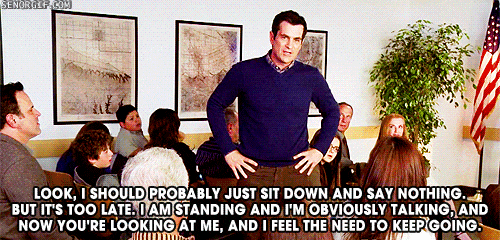Practical tips to make your next meeting a great one
Do you dread just about every business meeting—especially those first few with a new client? Do you get stressed out by the Skype or in-person meeting you have coming up?
Maybe a part of you feels excited because meetings feel right, but another part of you feels stressed out because you suck at meetings.
This feeling is completely natural if you’ve never felt in control of the meetings you’ve been having. I mean, it’s not like they taught you how to own your meetings in school!
Your experience has probably taught you that the loudest or most talkative person runs the meeting. Sometimes, you might even wish you could be more like them (minus any of those annoying off-topic additions or unnecessary details).
After every meeting you’ve had so far, you can’t help but feel you could have done better. You even worry about what clients think of you.
As an introvert, I can relate and empathize 100% percent.
But the businessman inside of me says it’s time to put on your game face and start conquering these meetings!
Otherwise, you’ll always be working against yourself. Don’t let the dread of meetings hold you back—it’s time to own them.
Use your hidden strengths
Contrary to your experiences so far, your introversion is actually the key for you to start owning your meetings.
Yup, I said your introversion.
You don’t have to be the loudest, most talkative, or most extroverted participant to be great in meetings.
You just have to be the most focused. Luckily, we introverts are really good at focusing quickly and intensely on what matters most.
“But I’m always focused in meetings, and yet don’t feel like I do well in them…”
This is probably true, because you’re not using your superpower to its full potential yet!
It’s not enough for only you to be focused. If you want to start owning meetings, you’ll have to learn how to keep others focused too.
After all, as a consultant or freelancer, prospects and clients are looking, even expecting you to guide most meetings you’re involved in.
So, how do you use your focus to become better at meetings?
It’s not as complicated as you think.
Start by making sure the meetings you lead or attend have a single focus. If not, decline the invitation or create separate meetings for each focus.
Establish this focus by asking: What should this meeting accomplish?
State it in one sentence. If you can’t, then it’s not focused enough yet. If it’s not focused enough yet, you probably don’t have a good grasp on what the meeting should accomplish.
This could lead to you stumbling while trying to make a point, since your mind and the conversation may be going in different directions. Attendees in the meeting will notice it too.
Having a single focus and understanding it clearly is part of setting up your meeting for success.
If you optimize your meetings with a good setup, it will help you prepare better!
Plan your participation
Let’s talk about preparation. How much time do you spend preparing for a meeting?
I’m surprised at how many freelancers don’t prepare for meetings. Winging it won’t help you or your meetings—especially when your aim is to influence your clients to make better decisions!
I admit, as you move forward in your work, the time you invest in preparing for a meeting will become less and less. This is even more true when you have the same types of meetings over and over throughout the life of your business.
Nevertheless, preparation makes all the difference.
So, how should you prepare for a meeting?
This will depend on your role in the meeting. Are you there to give information, or gather information?
If you’re there to gather information, then create a list of questions. Order them such that they naturally lead from one to the next.
The great thing about gathering information is that you’ll most likely be in your element as an introvert, because you’ll get to listen more and speak less.
However, for you to own a meeting, listening isn’t enough. Even if your primary role is to gather information, you still have to keep attendees focused.
Learn to rope people back into the single focus of the meeting when they begin to deviate or give irrelevant information.
You can usually do this by asking the right kind of question.
For example, asking a leading question can bring a person back into the focus of the meeting. Don’t worry, you’re not manipulating them; you’re being a professional and making sure you gather the right information.
On the other hand, if you’re there to give information, then be confident about the information you’re giving. Jot down key discussion points, and order them to create a logical flow of information.
When giving information, it’s important to remember that just being an expert and understanding your craft is not the same as being confident.
To become confident, you have to learn to verbally explain your topics of expertise in a succinct and compelling manner.
Your business depends on it! If you can do this well, you’ll soon begin to own meetings.
Reign in the ramblers
At most meetings, attendees will naturally have questions of their own. For you to truly own a meeting, you’ll need to give information in the order that makes the most sense while keeping everyone focused.
If someone asks a question that falls within your discussion points, you can tell them you plan to address that issue in a moment, but need to explain a few other things first.
When you do this, people learn to wait and see if you answer their question before asking it—which works in your favor (and makes for a quicker and more effective meeting!).

Other times, people will ask questions or discuss things that aren’t relevant to the meeting at all. Rope them back in by asking them a question relevant to the meeting’s focus, or ask them if they would like to schedule another meeting about whatever they’re interested in discussing.
I won’t lie: for me, someone deviating from the focus of a meeting is seriously annoying. It’s just human nature, though. Over time, I’ve learned how to rope people back in politely and with style (often without anyone noticing).
I have this one client who always deviates. Her mind runs 100mph, so she can’t help it! As we’ve worked together on multiple projects, she’s learned how to catch herself because of the way I usually rope her back in. She’s a good sport about it, which is why I enjoy working with her.
Clients appreciate that. They recognize someone’s effectiveness and feel better about investing their money with someone who stays focused and owns meetings. After all, that’s what they’re paying us for!
Practice makes perfect
One last thing you can do to prepare is to actually practice. Yeah, you’ll feel weird and maybe even awkward, but again: your business depends on it!
Practice explaining key points if your role is to give information. Or practice asking important questions if your role is to gather information during your next meeting.
As you start to intentionally become better at meetings, you’ll notice that meetings are a lot like learning how to play tennis. Once you learn to volley, you’ll eventually be good enough to score strategically—especially when it comes to sales meetings.
Introverts have the potential to be the best at meetings because of our abilities to listen and focus. If you can harness these strengths to help others use meeting time efficiently, you’ll own every meeting you ever have.




No Comments